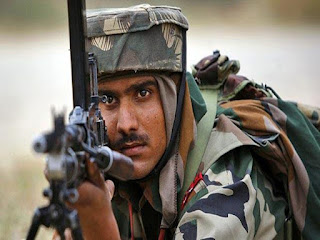It is the early morning of September 3, 2011 in the city of Sopore in the Kashmir valley. The joint team of Kashmir Police and army’s Rashtriya Rifles are carrying out an operation. They take down a house and soon, Abdullah Yuni, the chief operational commander of Lashkar-e-Taiba in the valley is killed.
Now, can you imagine this situation without AFSPA? No, because it is AFSPA which gives the army the right to search any place without any warrant and even fire, which in most cases leads them to terrorists coming from the other side of the border. The valley at present is in dire need of laws like AFSPA especially after the present Uri attacks scenario, and if it is revoked, that will definitely lead to disasters.
The AFSPA was enacted in 1958, to bring under control, what the government of India considered “disturbed areas”. It all started in 1951 when in Assam, the Naga National Council (NNC) declared that they have conducted a “free and fair plebiscite”, under which 99% Nagas want a “free sovereign Naga nation”. This led to boycott of 1952 general elections by the people and later on the boycott of government schools and officials. In order to deal with the situation, Assam government imposed the “Assam Maintenance of Public Order (Autonomous District) in Naga Hills”, in 1953. This intensified the police action against the rebels. But the situation worsened and the Assam Rifles had to be deployed. The government enacted the “Assam Disturbed Areas Act” of 1955, to combat insurgency in the region. But the Naga rebels could not be controlled even by the Assam Rifles and alongside the NNC formed “The Federal Government of Nagaland” in 1956. This led the then President Dr. Rajendra Prasad to promulgate the “Armed Forces (Assam and Manipur) Special Powers Act” on 22 May, 1958, which finally became “Armed Forces (Special Powers) Act, 1958”.
Later on, the act was passed for other states also, when the government hold the opinion that insurgency is rising, which included Punjab and Chandigarh, 1983, but thus was repealed later on in 1997. An act was passed for Jammu & Kashmir in 1990 and is prevailing till date. So, if people do protest against AFSPA, at least Nagas cannot, because they should know that they are themselves responsible for forcing the government to take such decisions.
The situation is not tense just in Jammu & Kashmir, it is equally dangerous in Assam and Manipur, especially Manipur. In the past years, militancy and insurgency had grown too much in the state, but it is because of laws like AFSPA only that the government has been able to control it to some extent. And to further monitor the situations, it is necessary for AFSPA to prevail.
- India shares a porous border with Myanmar and it is known that Myanmar has an open market for arms and ammunitions. The militants rising in Manipur are bringing weapons illegally from Myanmar and are then using them for illegal activities like extradition and kidnapping. Now, when the police becomes incapable to control, it become necessary to call in the army to control the situation.
- The grenade used by militants is found to be made in China.
The Kashmiris often complain about the brutal behaviour of conduct by the army men. But they should never forget that this is the same Indian Army which was there to protect them during the 2014 floods. They should not forget that this is the same Indian Army which travels in convoys to Kargil, Leh and Ladakh through Srinagar to provide them with milk, bread, oil and kerosene to sustain their livelihood.
Besides this, there also exists one moral angle which the people of the valley should recognize and even appreciate. The armed forces are called out only as a last resort when the civil machinery, including the use of paramilitary forces, fails. This is the final punch to save our society from regional violence caused by home grown insurgents or ignited from abroad. If this fails, our democracy fails, and India could become a ‘failed state,’ giving birth to ‘war-lordism’. Besides, the armed forces are expected to conduct their operations with anonymity, such that the names of their officers are not divulged. The army, unlike the police, operates as a group in sections or platoons. Their anonymity will be compromised if they are dragged to the courts several years later for their alleged excesses and pulled out from faraway places where they may be posted. This will also affect their morale in risky operations if they have to look over their shoulders for fear of future prosecutions. After all, morale is the bedrock of the armed forces.
Moreover, there are already existing section 45 for police and section 193 for CRPF. Then what is the problem by securing some clauses for our brave soldiers.
People of both Jammu & Kashmir and Assam and Manipur must know what will happen if AFSPA is revoked. It is true that life will be more free, people will be free to gather anywhere in as large numbers as they want. But there is need to look on other side of the coin as well.
- If AFSPA is revoked , there will be chaos everywhere. All Parties Hurriyat Conference will spread their “Jihadi” agenda in open and number of brainwashed youth will increase exponentionally.
- Terrorist activities and trainings will be carried out easily.
- Withdrawing AFSPA will embolden the insurgents and militants in these states.
- Constant importing of RDX will prevail which at present is under control.
Col. Abhay Rishi (Retd.) has very well said: “Let us withdraw AFSPA for one year and see how the states concerned cope.” One should always remember that national security is more important than anything else.

Comments
Post a Comment
Your comment is under moderation.